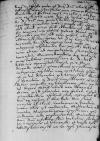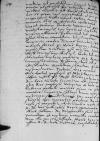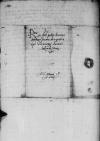Quo modo se habeat causa ⌊Cornelii a Staden⌋ cum ex scriptis meis, tum ex ipsius relatione, Reverendissima Dominatio Vestra iam procul dubio cognovit. Equidem quantum potui, praesto ⌊illi⌋ affui, sed aliud, quam quod obtentum est, obtineri hoc tempore non potuit. ⌊Petrus Brant⌋ quid glorietur, nescio, sed eum nihil aliud obtinuisse scio, quam ut domini ⌊consiliarii terrarum Prussiae⌋ cognoscant, num in integrum restitutio dari pupillo debeat, num etiam ad inventarium faciendum teneatur, quemadmodum ex inclusa praesentibus commissione Reverendissima Dominatio Vestra uberius cognoscet. Causa, quae hic ei dicenda erat, quam ob rem pupillum in integrum restitui non oporteret, istic ab eo ut diceretur, est remissus. Quod si decretum a dominis ⌊consiliaris⌋ fuerit deberi pupillo restitutionem fore puto, ut ⌊regia maiestas⌋ aliud non decernat. Quare, quod glorietur, non habet.
Citati quemadmodum absoluti sint, cognoscet Reverendissima Dominatio Vestra ex responso illis dato. Non sunt prorsus absoluti, contumaciae tantum poena illis est condonata. Mittentur ad ⌊comitia⌋ ⌊Marienburgum⌋ ⌊consiliarii⌋, qui ⌊Gedanum⌋, inde proficiscentur, quantum ex ⌊reverendissimo domino⌋ intellexi, duo palatini, fortasse ⌊Posnaniensis⌋ et ⌊Plocensis⌋, et unus episcopus, ⌊Vladislaviensis⌋ne an ipse ⌊Plocensis⌋, nondum est constitutum. Legati ⌊vicini⌋ parum profecisse hic videntur. Mittitur quidem nuntius ad ⌊serenissimos fratres⌋, veru[m] non is, quem ipsi cupiebant et pro quo magnopere laborarunt. Cetera omnia minime illis ex sententia ceciderunt.
Legati ⌊serenissimorum fratrum⌋ venerunt huc: ⌊Vratislaviensis episcopus⌋ et ⌊Zabcka⌋ vicecancellarius. Petierunt, ut essent libera commercia, ut societas armorum contra ⌊Turcas⌋ iniretur, ut [ne] moleste ferret
serenissima
⌊maiestas regia⌋ dotem promissam nondum esse missam. Priu[s] illud concessum illis est, modo ut ant[e] solvantur nostris pecuniae, quae decreto commissariorum ⌊Vschovae⌋ sunt illis adiudicatae. Secundum secretam habui[t] responsionem, tertium ferre oportet.
Quo cogitet proficisci serenissima ⌊maiestas regia⌋, cert[i] adhuc nihil est. Mihi deliberatum es[t], Deo bene iuvante, ⌊Cracoviam⌋ ad sacros istos dies proficisci. Nunquam in vita me[a] labores pertuli maiores quam in istis ⌊comitiis⌋. Cuperem saltem unum mense[m] respirare, si modo liceat.
Pro novis, qu[ae] scripsit, ago ingentes gratias. De me[a] erga se perpetua observantia recte sibi Reverendissima Dominatio Vestra pollicetur. Neque opinionem illius fallam.
De burgrabio fuit inte[r] ⌊primatem⌋ et ⌊nostrum⌋ nonnulla content[io], nam ille pro ⌊Constellato⌋, meus vero pr[o] ⌊affine⌋ Reverendissimae Dominationis Vestrae laborat. ⌊Constellatus⌋ si factus sit burgrabius, pollicetur auctorita[te] sua effectum iri, ut omnes isti motus, qui sunt religionis causa concitati, sedentur. Moleste itaque tulit ⌊primas⌋ pro ⌊affine⌋ Reverendissimae Dominationis Vestrae esse impetratum atque, ut nunc sunt tempora, periculum est, ne secus eveniat. Meo itaque iudicio bene rationibus ⌊affinis sui⌋ consuluerit Reverendissima Dominatio Vestra, si
serenissimae
⌊maiestati regiae⌋ gratias egerit pro burgrabiatu promisso ac una supplicaverit, ne de proposita sententia se dimoveri patiatur. Si mittetur ⌊Gedanum⌋ Secundas, vereor, ut aliquid proficiat. Vellem ego meum potius proficisci, quod si suaserit suis litteris ⌊maiestati regiae⌋ Reverendissima Dominatio Vestra, fortasse citius perfecerit.
⌊Ioannis Holstein⌋ non obliviscor, nisi quod paulo magis vacuus ut sim a negotiis, id exspecto.
Deum precor, ut Reverendissimam Dominationem Vestram diu servet incolumem. Cuius gratiae me commendo.



